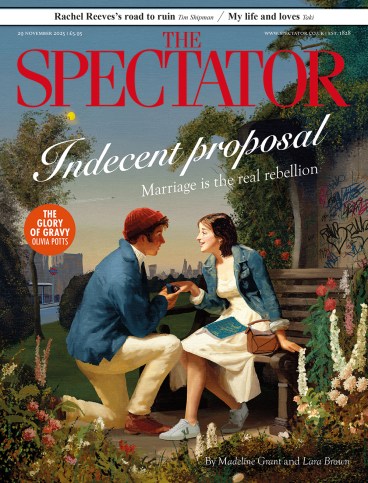
Anybody growing weary of the debate surrounding the BBC’s unexamined assumptions and biases about modern politics might have expected to find some relief in a scholarly documentary about the sack of Rome in AD 410. Sad to say, though, the first episode of Civilisations: Rise and Fall offered very little of it.
Of course, it’s not unusual for history programmes to want to prove that the people in the past were Just Like Us. But in this case the parallels drawn/rather desperately imposed were a particularly uncanny fit with those same pesky assumptions and biases.
It transpired, for example, that Ancient Rome ‘was a two-tier society that favoured the rich while failing to solve the challenges of mass migration’; a place where ‘the 1 per cent’ lived in irresponsible luxury and ‘stereotypes’ about barbarian foreigners were ‘weaponised’. OK, so Alaric the Goth may have razed the world’s greatest city, but that was only because he was ‘a refugee treated with cruelty and violence’ and therefore inescapably ‘driven to violence’.
The first version of Civilisations in 2018 was trumpeted as a much-needed update of Kenneth Clark’s culpably singular Civilisation. Out went the Eurocentrism and the solitary patrician voice. In came a more global perspective and episodes alternately presented by Simon Schama, Mary Beard and David ‘Rubbish at Spotting Traitors’ Olusoga.
Even so, the feel of the lecture room remained – something the new series seeks to banish by including dramatic reconstructions (Alaric looking oppressed but determined, the 1 per cent looking smug) and having short contributions from lots of different historians.
Well, sort of different. Although the demographic boxes were duly ticked on Monday, nobody dissented from the central thesis that the Romans essentially had it coming for not addressing disparities in wealth or integrating the Goths and Vandals into their society – which is apparently all the Goths and Vandals ever really wanted.
The programme talked much about ‘lessons from history’, and the one we should learn here was clear: unless we stop being racist, start being nicer to immigrants and realise that – as the most lyrical of the contributors put it – ‘wealth inequality hollows out societies into a brittle shell that can be cracked asunder by numerous shocks such as climate change’, we’ll have it coming too.
Initially, BBC1’s new drama Prisoner 951 seemed more confident of western superiority to barbarianism. Telling what it unambiguously captioned ‘the true story’ of Nazanin Zaghari-Ratcliffe (Narges Rashidi), it began with her preparing to fly back to London after a trip to show her Iranian parents their 22-month-old granddaughter. Having rung her impeccably uxorious British husband Richard (Joseph Fiennes) to discuss her homecoming ice cream, Nazanin headed for the airport – where she was arrested by some sinister men with beards and accused of being a British spy.
The beardies told her they’d be holding her for only 24 hours, but this turned out to be just the first of many cruelly broken promises of imminent release. Instead, she was shuttled in a blindfold from one terrible prison to another until a devoutly Muslim judge sentenced her to five years in solitary confinement for plotting to overthrow the regime.
At this point, the author’s message in Prisoner 951 appeared to be what Richard shouted to himself early on after another promised release hadn’t happened: that the Iranians were ‘fucking, fucking bastards’. But in this week’s second episode, the programme increasingly came to resemble one of those TV political thrillers (i.e. most of them) where the real bastards might well belong to the British establishment.
To start with, the advice given to Richard by the smoothies in suits sounded like possibly justified realpolitik. Making a public fuss about Nazanin would merely strengthen the resolve of the hardliners in Tehran and so damage his wife’s chances of making it out soon. But we were gradually made to recognise that Tehran’s communications to Richard about getting the British government to ‘pay their debt’ to Iran might have some validity.
For tangled historical reasons – deftly untangled in the drama – it seemed as if the UK really did owe Iran £400 million, and that if it was paid, Nazanin would be set free. Except that when Richard confronted Foreign Office ministers with his assiduously researched evidence, they suggested he should get therapy as he was obviously, if understandably, ‘emotional’.
Prisoner 951 is primarily based on a forthcoming book by the Ratcliffes – and so told firmly from their point of view. So far, this has two distinct consequences. On the one hand, you can’t help guiltily wondering whether, say, their marriage was as preternaturally perfect as it’s portrayed here – or if there might be a plausible counterargument to their belief in Foreign Office heartlessness and perfidy. On the other, it does make the programme intensely and, in the end, irresistibly affecting.







Comments